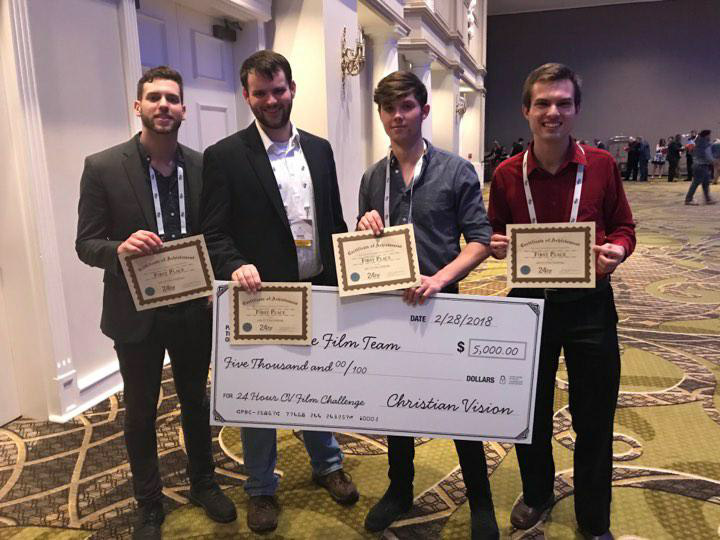Imagine cramming everything you’ve learned in college into one day. Now add in a high-pressure contest, a cameo appearance from Vice President Mike Pence and an oversized check for $5,000.
That description just about sums up the experience of seven students who competed at the National Religious Broadcasters Convention last week.
After competing for 24 consecutive hours, the cinema students won first place and the JMC took third in their respective competitions.
The cinema team moved up from last year’s second place spot while the JMC team represented BJU for the first time in four years.
In addition to the teams that attended the event, another team of cinema students competed in an online competition hosted by the broadcasting organization.
The teams, which left early last week for the Nashville competition, each received a go-box containing a list of instructions, completion guidelines and seven energy drinks for the long day ahead.
The JMC team deviated from their original security story idea to a story on gun control. The story featured footage of a speech by Mike Pence, who was a headliner at the convention.
C.J. Billiu, a member of the JMC team and of the WBJU crew, said the competition forced his team to produce in one day what normally takes WBJU up to two weeks to create.
“It took a lot of flexibility and a lot of caffeine,” Billiu said.
Billiu said he was glad to see a JMC team representing BJU again. He said he especially enjoyed showing up some rival teams who he said had possibly underestimated the capabilities of BJU students.
“This is the first time we’ve competed in four years,” Billue said. “To pull a bronze, third place, out of it is pretty awesome.”
The cinema students won first place for their film on adoption. Advancing the theme of hope, the film tells the story of two women who are revealed to be mother and daughter by the end of the film.
Caleb Murphy, the film’s director, said adoption is a concept that hits close to home for him and other Christian because of its parallels to the Gospel.
Other films had either strong cinematography or a strong narrative, according to Murphy. However, he said his team produced a film that walked the line between both.
Murphy compared 24-hour competition to producing his upcoming senior film. While the three-semester capstone project offers seemingly endless possibilities, those possibilities can stagnate production rather than drive it forward.
Murphy said the limitations in the competition actually helped him produce.
“The limitations forced us to come up with something creative,” Murphy said. “It’s scary to make a film in such a short amount of time, but it’s also really fun.”
Stephen Dysert, the film’s cinematographer, said the competition was a welcomed break from his senior film.
He said he enjoyed working with fellow seniors who he otherwise would not have had a chance to work alongside.
Dysert said the team began to second guess their choice to pursue such an ambitions story. After the team’s sponsor, Christopher Zydowicz, had to watch the film twice to get the story’s point, the team was really doubting their decision.
When the time for the award ceremony came around, the cinema team’s first-place award was the very last award to be announced.
“So we’re sitting there on the edge of our seats not really expecting to win, not looking forward to coming back to Greenville as losers, and then they called out first place and it was us,” Dysert said.
“It was a surreal moment as everybody clapped and they played our film.”
Dysert said he was amazed by the progression the film underwent from a vague idea to a final product. He said winning the contest was both an emotional and humbling experience for him.
“I think the best part of it all, as awesome as it was to win the $5,000 prize, was to see people tear up watching our film and to hear how people had enjoyed it,” Dysert said.
Zydowicz said in addition to experience, the completion gave students an opportunity to have their work seen by the industry’s leaders.
Thousands in the film industry attend the convention, and the BJU students were able to network with potential employers and contacts.
“I’m proud, very proud [of my students],” Zydowicz said. “We’re not training them to stay here. We’re training them to go out and be competitive. And this proves they’re succeeding.”

























































